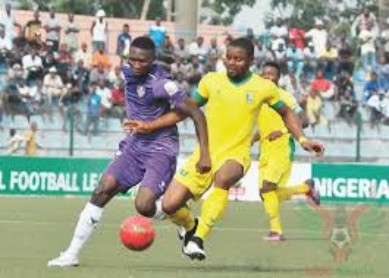Up to last evening, I had no contingent subject to look at or digest this week and that made me to be excess, abandoned and started to consider making one more course of action of either utilizing any of my past reviews or something different.
Nonetheless, before I did that, I chose to go through to my inbox and check whether there is any material which can fill the vacuum.
As I was going through my inbox, I all of a sudden went over a captivating and particularly captivating and educative material with the above title.
After totally examining the material, in spite of the way that the material has no author or its author’s was obscure, I found it fascinating and entrancing to partake considering a couple of reasons.
That is because we are totally aware of how critical and significant a football league is, to the improvement of the round leather game is in every country.
Even more fundamentally, the writer has a propensity touches various pieces of Nigerian league which impedes its turn of events, progress and headway. Thusly:-
The deterioration of Nigeria’s soccer league can be attributed to several factors, including poor administration, inadequate funding, and lack of infrastructure.
Over the years, mismanagement and corruption within the Nigerian football governing bodies have led to the misallocation of resources and the inability to create sustainable structures for the league’s growth.
Additionally, low investments in stadium facilities, player welfare, and technical development have discouraged both local and international sponsorships, leaving the league financially unstable.
The inconsistent enforcement of rules, match-fixing allegations, and inadequate broadcasting deals further eroded public trust, resulting in dwindling fan engagement and support.
This situation has led to a mass exodus of talented players seeking better opportunities abroad, weakening the league’s overall competitiveness and appeal.
Favouritism, nepotism, and tribalism have further compounded the league’s challenges, overriding the spirit of patriotism that should drive national development.
Decisions in team selection, coaching appointments, and administrative roles are often influenced by personal connections or ethnic affiliations rather than merit.
This has stifled the emergence of competent individuals who could bring innovation and growth to the league.
Such divisive practices have alienated potential investors and supporters, as the focus shifts from collective progress to narrow, self-serving interests.
To overcome this, there is a need for a cultural shift towards meritocracy and inclusion, emphasizing the shared goal of national pride.
Policies should be implemented to promote transparency and accountability in decision-making, ensuring that roles and opportunities are allocated based on competence and vision.
By fostering unity and eliminating these divisive tendencies, Nigeria can rebuild the trust and enthusiasm necessary to revive its soccer league.
To revive the Nigerian soccer league, a comprehensive reform strategy must be implemented. While transparent governance structures should be established, with accountability mechanisms to curb corruption and enhance trust.
Increased investments in modern infrastructure, such as quality stadiums and training facilities, will attract more fans and sponsors.
The league needs to partner with media houses for better broadcasting deals, ensuring wider coverage and increased revenue.
Establishing youth development programs and improving player welfare will also foster talent retention and growth.
Encouraging corporate sponsorships through tax incentives and creating a robust marketing strategy to enhance the league’s visibility locally and internationally will help rejuvenate the league.
Additionally, involving former players and football enthusiasts in the decision-making process will bring practical insights and foster a sense of ownership among stakeholders. These measures, if implemented effectively, can restore the league’s reputation and competitiveness

